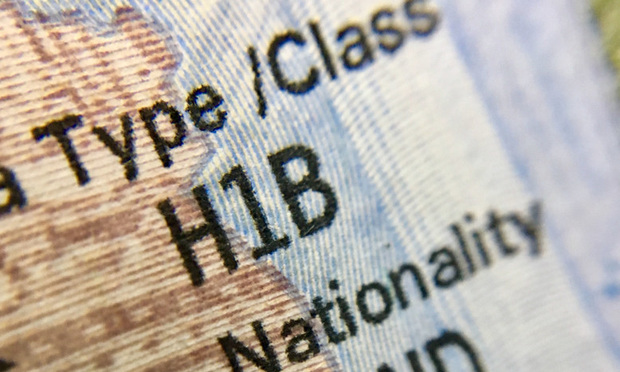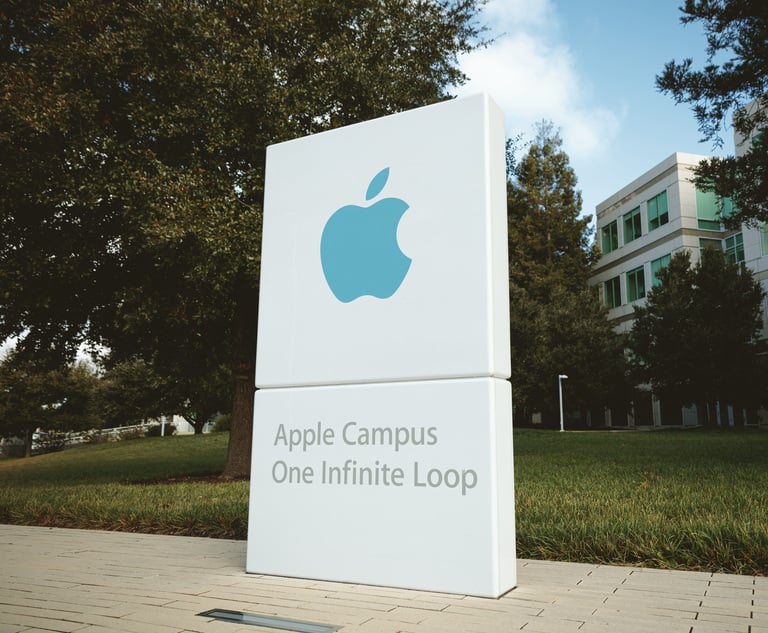How Trump's Latest Suspension of Worker Visas Could Affect Tech Industry
"If you're a company who is hoping to bring intracompany transferees into the U.S. or new H-1Bs into the U.S., it's going to hit your bottom line," said Kelli Duehning of Berry Appleman & Leiden in San Francisco.
June 23, 2020 at 08:30 PM
5 minute read

President Donald Trump's continued suspension of certain temporary work visas means the tech industry will have to survive without hiring new foreign talent through the end of the year.
Although some lawyers say the order will make it more difficult for tech companies to recover in the precarious economic environment, others were surprised by the loopholes the administration left open.
On Monday, Trump issued a presidential proclamation renewing the suspension of certain temporary work visa programs including the H-1B and L-1A/B visa programs until Dec. 31. The administration said the move was an effort to ensure companies fill open positions with domestic workers as more than a quarter of the American labor force have filed for unemployment benefits amid the coronavirus pandemic, according to data from the U.S. Department of Labor.
Valentine Brown, a Duane Morris partner in the firm's employment, labor, benefits and immigration practice group in Philadelphia, said in an email that banning the entry of H-1B and L-1A/B visas will do more harm to high-tech and multinational employers' efforts to reopen their businesses than the limited help provided by the 525,000 jobs the administration estimates will now be filled by American workers.
Plus, she said, these specialized tech jobs are not the type of positions that would have been subject to furlough or termination during the pandemic, so trying to fill them with Americans who have been furloughed is unlikely to be a successful strategy for employers.
One of Brown's clients, a multinational pharmaceutical trials specialist that is working on COVID-19-related projects, transfers international workers to the U.S. through the L-1B visa program. To qualify for the L-1B, workers must demonstrate specific knowledge of the company's operations or products.
"Eliminating this program until the end of the year will greatly hamper this company's operations, capacity to build volume of operations, and to strategize and place its most valuable resources in the most beneficial office locations," she said.
Kelli Duehning of Berry Appleman & Leiden in San Francisco said many employment lawyers in her circle were bracing for much worse.
"We were surprised by the sheer fact that it didn't have more teeth to it," Duehning said.
The proclamation doesn't appear to apply to any employees who are already in the U.S. and have a valid visa. It also does not pose restrictions for Optional Practical Training work authorization or J-1 student visas. "I have a feeling the administration did not realize that they left that open," she said.
But Duehning said if businesses are relying on overseas talent, they are going to be affected by this order.
"If you're a company who is hoping to bring intracompany transferees into the U.S. or new H-1Bs into the U.S., it's going to hit your bottom line," she said.
During the pandemic, Duehning has seen an uptick of mergers and acquisitions due to the economic climate. However, companies that merge or acquire foreign entities are not going to be able to bring staff into the U.S. to train workers, she said.
A White House fact sheet on the proclamation also promises that, under Trump's direction, the administration will shift away from the H-1B lottery system to "prioritize those workers who are offered the highest wage, ensuring that the highest-skilled applicants are admitted."
However, the order itself directs the secretary of Homeland Security "to take other appropriate action regarding the efficient allocation of visas."
Duehning said that the fact sheet seems to hint that the administration is considering implementing a rulemaking process to strengthen the H-1B rule. Nothing has been submitted to the U.S. Office of Management and Budget yet, she said. It's possible that the administration submits an interim final rule or temporary rule, but "I can't imagine anything like that passing without immediate litigation ensuing," she said.
The proclamation does offer an exemption to any international workers who could serve "in the national interest" as determined by the secretary of State and the secretary of Homeland Security. Duehning said she could potentially see companies taking advantage of that loophole to make a case for how certain employees could help with the recovery of the U.S. economy.
At a time when the tech industry has vowed to emphasize diversity more than ever, Duehning does not foresee the order presenting major roadblocks to promote diversity in the workplace. She said many companies piggyback off the diversity and inclusion efforts of universities, and those pipelines will remain open.
Ruth Spillane of Fragomen in San Diego said that although immigration and employment lawyers might feel relieved that the proclamation paled in comparison to the rumors and speculation surrounding the order, there will still likely be a significant impact on businesses.
"While certain proclamations might hinge on the economy or COVID impact to the economy, this is really impacting people's lives, it's impacting businesses and how they might be able to recruit foreign talent and, in turn, be more successful."
This content has been archived. It is available through our partners, LexisNexis® and Bloomberg Law.
To view this content, please continue to their sites.
Not a Lexis Subscriber?
Subscribe Now
Not a Bloomberg Law Subscriber?
Subscribe Now
NOT FOR REPRINT
© 2025 ALM Global, LLC, All Rights Reserved. Request academic re-use from www.copyright.com. All other uses, submit a request to [email protected]. For more information visit Asset & Logo Licensing.
You Might Like
View All


'You Start Lower, You Stay Lower': Apple Hit With Class Action for Gender Bias
Law Firms Mentioned
Trending Stories
Who Got The Work
J. Brugh Lower of Gibbons has entered an appearance for industrial equipment supplier Devco Corporation in a pending trademark infringement lawsuit. The suit, accusing the defendant of selling knock-off Graco products, was filed Dec. 18 in New Jersey District Court by Rivkin Radler on behalf of Graco Inc. and Graco Minnesota. The case, assigned to U.S. District Judge Zahid N. Quraishi, is 3:24-cv-11294, Graco Inc. et al v. Devco Corporation.
Who Got The Work
Rebecca Maller-Stein and Kent A. Yalowitz of Arnold & Porter Kaye Scholer have entered their appearances for Hanaco Venture Capital and its executives, Lior Prosor and David Frankel, in a pending securities lawsuit. The action, filed on Dec. 24 in New York Southern District Court by Zell, Aron & Co. on behalf of Goldeneye Advisors, accuses the defendants of negligently and fraudulently managing the plaintiff's $1 million investment. The case, assigned to U.S. District Judge Vernon S. Broderick, is 1:24-cv-09918, Goldeneye Advisors, LLC v. Hanaco Venture Capital, Ltd. et al.
Who Got The Work
Attorneys from A&O Shearman has stepped in as defense counsel for Toronto-Dominion Bank and other defendants in a pending securities class action. The suit, filed Dec. 11 in New York Southern District Court by Bleichmar Fonti & Auld, accuses the defendants of concealing the bank's 'pervasive' deficiencies in regards to its compliance with the Bank Secrecy Act and the quality of its anti-money laundering controls. The case, assigned to U.S. District Judge Arun Subramanian, is 1:24-cv-09445, Gonzalez v. The Toronto-Dominion Bank et al.
Who Got The Work
Crown Castle International, a Pennsylvania company providing shared communications infrastructure, has turned to Luke D. Wolf of Gordon Rees Scully Mansukhani to fend off a pending breach-of-contract lawsuit. The court action, filed Nov. 25 in Michigan Eastern District Court by Hooper Hathaway PC on behalf of The Town Residences LLC, accuses Crown Castle of failing to transfer approximately $30,000 in utility payments from T-Mobile in breach of a roof-top lease and assignment agreement. The case, assigned to U.S. District Judge Susan K. Declercq, is 2:24-cv-13131, The Town Residences LLC v. T-Mobile US, Inc. et al.
Who Got The Work
Wilfred P. Coronato and Daniel M. Schwartz of McCarter & English have stepped in as defense counsel to Electrolux Home Products Inc. in a pending product liability lawsuit. The court action, filed Nov. 26 in New York Eastern District Court by Poulos Lopiccolo PC and Nagel Rice LLP on behalf of David Stern, alleges that the defendant's refrigerators’ drawers and shelving repeatedly break and fall apart within months after purchase. The case, assigned to U.S. District Judge Joan M. Azrack, is 2:24-cv-08204, Stern v. Electrolux Home Products, Inc.
Featured Firms
Law Offices of Gary Martin Hays & Associates, P.C.
(470) 294-1674
Law Offices of Mark E. Salomone
(857) 444-6468
Smith & Hassler
(713) 739-1250







